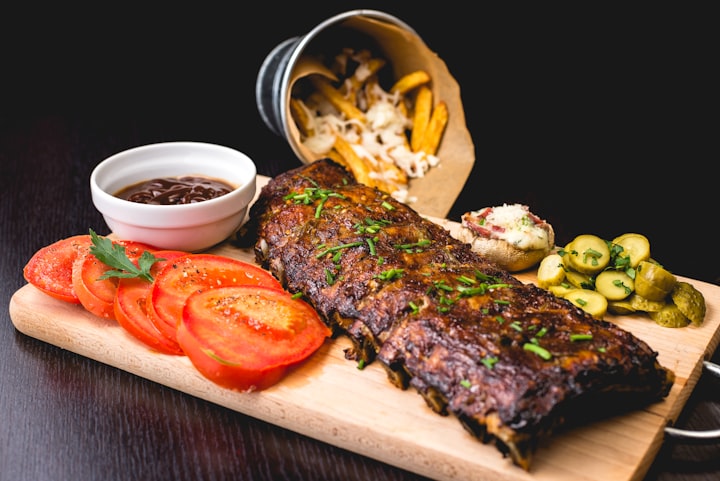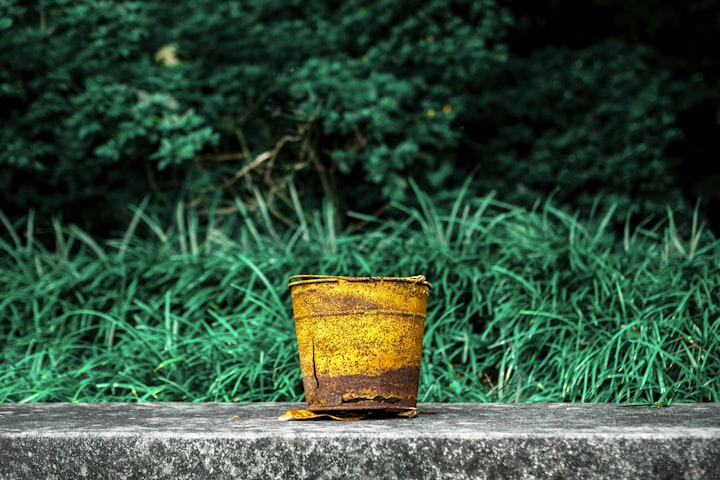Do good and evil exist?
Presented through food

Do good and evil exist?
To answer the question of good and evil I first need to understand what those words and by extension subjects mean. To compare them I have to look at the principles of morality - where right and wrong decisions, choices and actions exist. The good action would be approved and accepted as desirable, the evil one would be regarded as unacceptable and judged upon. Those are the concepts people created. As such there must be a need for them to exist. Take a step back, and good and evil must have commenced somehow for people to grasp them as being present. They are as real as we are, as long as we are, as we are looking at goodness and evil happening in front of us.
Good and evil in food
Killing, for example, is bad and saving life is good, yet saving Vladimir Putin from falling off the cliff at this very moment would be a bad [moral] idea, whereas simple unwitnessed inaction would save countless lives of people fighting Putin’s war.
To truly get around my point of good and evil existing I have to look at those two sides of one coin aka morality through the perspective I know and understand.
In my case, I am good at food. If I can think of a good person and action as well as counteracting evil surely there are some things I can discover running that line through the dimension of one of human lifelong necessities.
Growing Food
One of the first things that happen to food, before we even touch it - it gets produced. The slight but important distinction in this text will be the creation of food (production) and the making of food, focused on making produced food edible, available and useful. Where it is farmed or hunted or foraged food comes from somewhere. Is the making of the food good? Undoubtedly yes. It is good to be fed and feed people. Producing the food must have been the first, most necessary thing that happened. Sex, sleep and feeling safe are much needed but without simple action of breathing and eating (as well as drinking water of course) are shortcoming luxuries.
It is only upon closer look in the light of all the basics of life that I imagine turning around and asking - was it necessary? Did I hunt because it is the right thing to do or because I simply didn't see any other way, or was I following my desire to eat meat? I could ask the same question later, after settling and farming the land - was it necessary for me to take this land and make this food, or did I want to eat this and make my life easier by not going into the forest and looking for the berries, nuts and mushrooms? In either case, there will be a line of thinking that will bring me to the answer. To aline with my (and collective) moral principle (if such exists (we will get to that later)) to accept my actions as good. That is of course if I do have time to question my actions, possible choices and surroundings I use to reach my goals.
A much easier question to answer is whether it is evil to destroy food. Undoubtedly yes. If food exists and is needed, making the act of destruction and resulting hunger would create suffering. Unnecessary suffering or pain without choice, where someone destroys your food, is an evil act. It would barely matter at that point if the choices to come to that food were right or wrong, say you stole that bread because you were hungry, returning food would not make this situation better (generally) as the suffering would persist. But it does raise another question: why was someone hungry in the first place? Are they hungry by choice or by another immoral act that leads to this? And it wouldn't stop there because the process of figuring out which of two evils comes first would eventually take us to the conclusion: some evils are better than others. And more questions of the goodness of evils, absolute goodness/evilness and duality of subject matter.
Growing food is good until it becomes a waste.
Making food
Before we can indulge in the lavish dinner over the table barely holding the hefty dishes of colourful delight that would indulge our senses and appetite, let’s look behind the curtain and see who and what made it possible. And where the evil hides again.
If the production of food is good and makes lives better, making foods edible and tasty is an extension of a good act. More people can get fed and feel pleasure, another one of the less necessary yet often most desirable needs.
I think kitchen work is one of the most amazing and at the same time less desirable jobs. It is neither good nor evil. It is hard work that requires long hours and particular skills to do it, whether you are feeding a camp of refugees or a queen of England. The tastes are what sets them apart.
I would always aim to make food that others desire, by taste or need. Healthy dishes over the years extend the lifespan of others and contribute to positive physical and mental states. Yet before I can start making anything I have to know who it is that I am feeding and what are their desires/needs. Feeding a diabetic a cake can have dire consequences yet if that’s what they come to pay for in the restaurant, am I a bad person to cater for that? With or without prior knowledge? If I would have children I would feed them loads and loads of fruits, beans, nuts and vegetables. I would think I am a good parent even when my children would find it disgusting and cry once in a while. Look closer, in the moment tears pour over the dinner table in the fit of revolt against homemade vegetable lasagna it doesn't seem like I am doing the best of jobs. You might just see a person who makes others upset, takes away their freedom and disregards personal preferences.
Eating Good and Evil
Here is a modern-day food dilemma. Meat or no meat. According to one of the most recent scientific studies, there is now a clear benefit of choosing a vegan meal instead of vegetarian, fish and meat-based ones, based on the assessment of greenhouse emissions, water and land use. In light of the climate crisis - food matters.
I would like to point out that good decisions like making food and feeding people healthy food can still be evil. When compared. There is no doubt that eating makes for a great life decision - it makes every one of us stay alive. And it is not the food that is responsible for most people's atrocious acts, even when they use food as a tool to commit them. Yet food is part of who we are and eating it is a choice of contributing to a particular way of farming, land use, water use, hunger in other places and other people’s health. Eating might be an isolated and necessary act if you are alone, but on a modern-day Earth food is rarely produced by the person who is eating it and rarely it is known how food came to be what it is on the table by the person who can afford to double or triple their portions.
The good doesn't come from anywhere and so is the evil. They are the outcome of the things happening. An action. Morality exists because we want it. We want it because we need to separate our choices and actions into useful categories. A simple binary system of good and evil is our way to operate in the complex world. And it is the complexity of every simple answer that is often overlooked to make the good and the evil shallow, easy-to-understand concepts. Morality is complex, we mustn’t take it for granted.
Is it us?
Yes.
I say it is humans whose perception and consciousness of things necessitated the creation of good and evil. People use morality as the guiding principle. We can’t see the start and end of evil because they don't exist. With enough time we can observe what we consider moral and immoral acts and set the record and the abstract scale. The result is broad definitions, grey areas, an unquestioned understanding of actions and their results, and a lack of nuance before quick judgment.
I believe good food exists and it is healthy, whatever that means to you, and just, and vegan, thanks to the studies we have seen. Good food is also irresistible, indulgent, fatty, present in abundance and somehow often packed into the pinky piggies, large-eyed cows, extracted from where the baby calf gets its strength and covered in a whitish coat of a goat.
Written by TheFoodGuy for FoodEdd.com
Ask your food question and get food ed. (on website, Insta or a comment HERE)
About the Creator
The Food Guy
I read about food politics like it's a Harry Potter.
Eating my way through culture and cooking up the future.






Comments
There are no comments for this story
Be the first to respond and start the conversation.